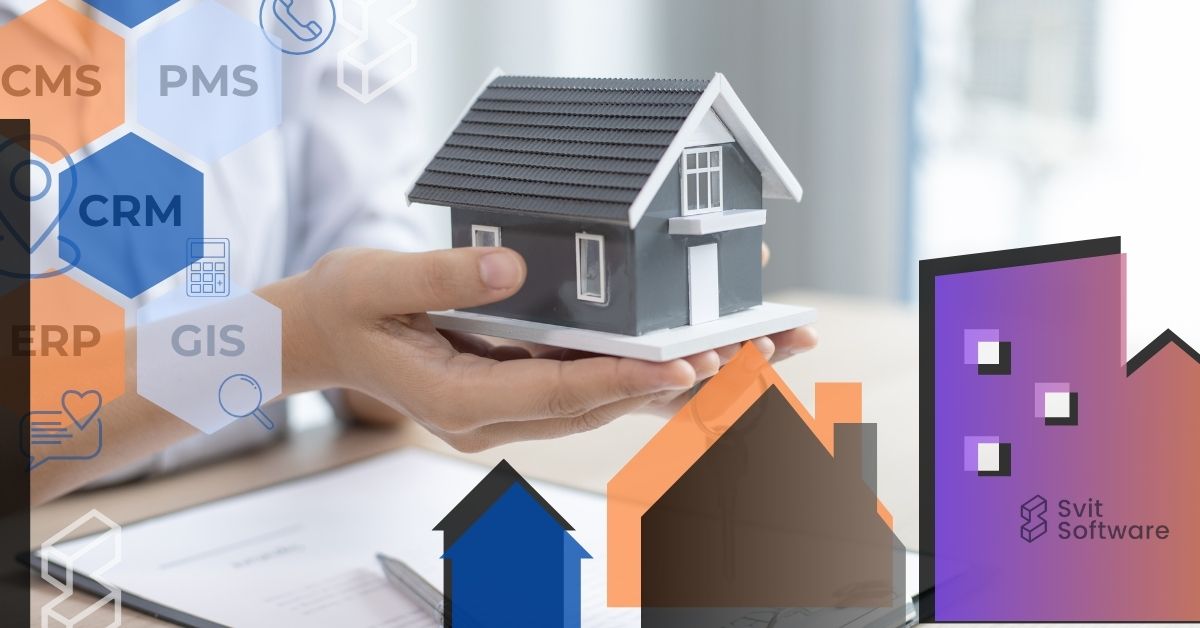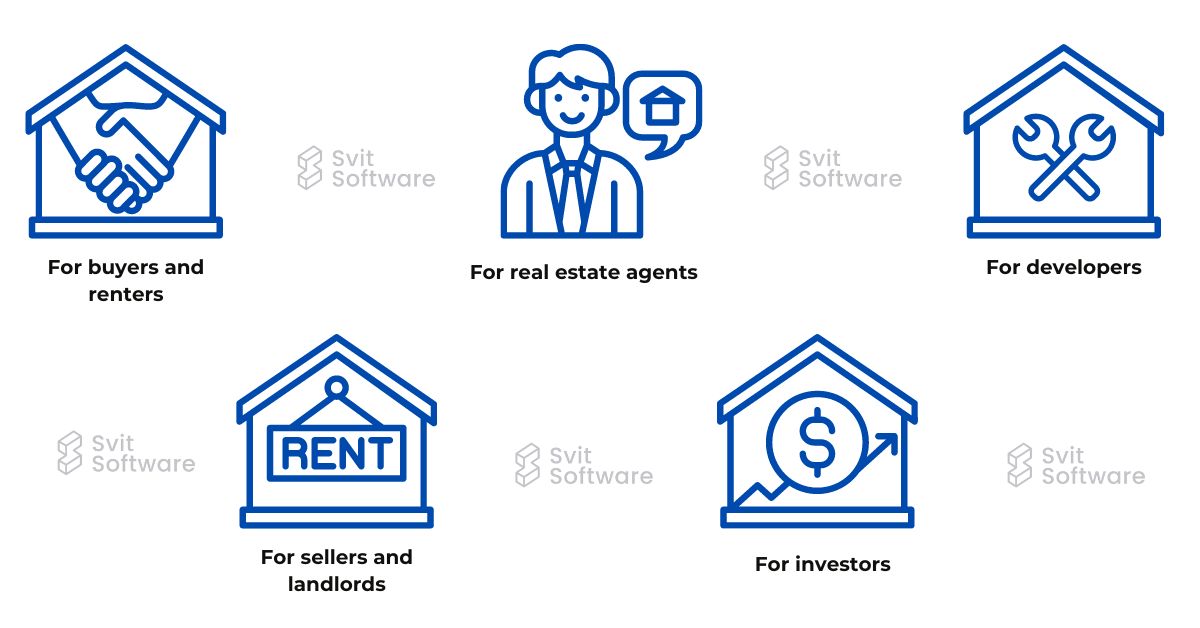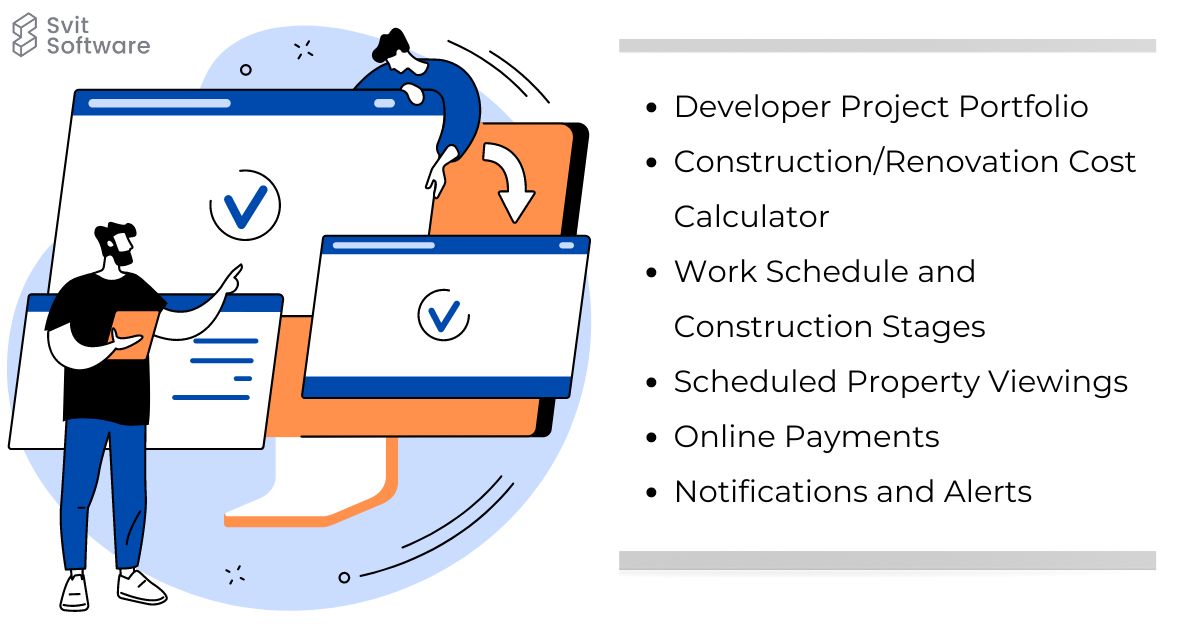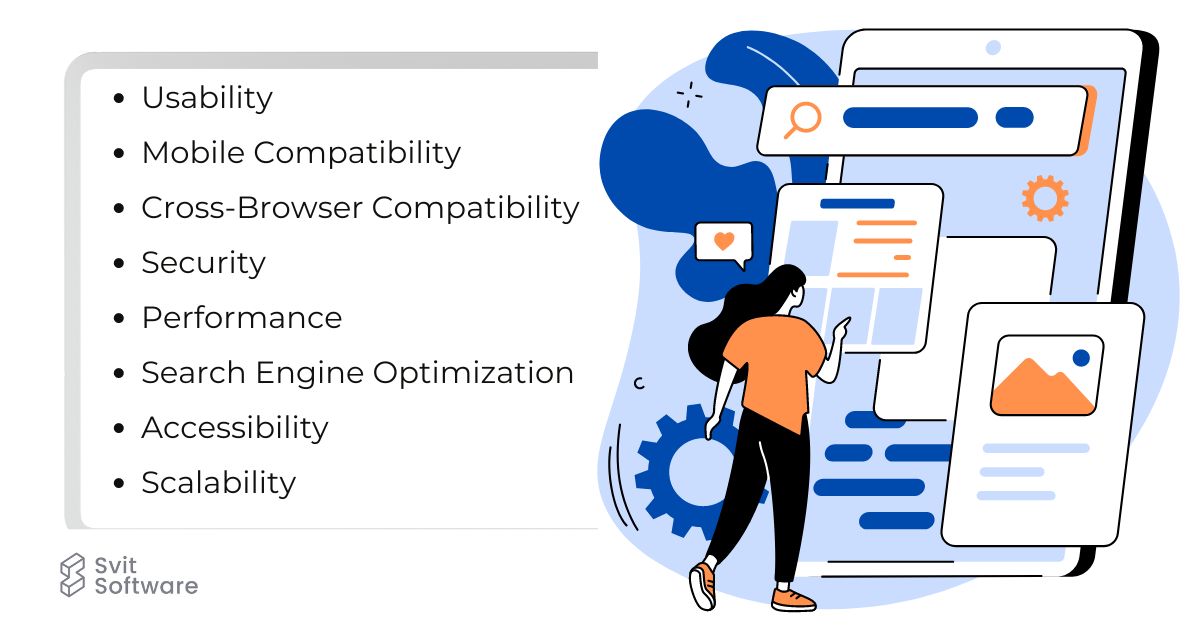Real Estate Platforms: What to Know When Developing an App




With the help of modern real estate platforms, buying, selling, and renting properties become easy and convenient processes. These online resources offer a wide selection of properties to suit every taste and budget, allowing users to quickly find residential or commercial spaces using relevant filters, explore detailed information, and interact easily with real estate agents. Thanks to innovative technologies: virtual tours, online consultations, and secure transactions, modern real estate platforms create a reliable environment for successful deals and satisfied clients. Whether a person is searching for a new home or planning to sell or rent out their property, such online resources are invaluable helpers and advisors.
When creating your own real estate platform, be prepared for a challenging yet exciting process. It’s important to build a platform that is not only convenient for users but also reliable and innovative. Remember that every detail matters, so don’t forget about quality and security. Make your project stand out not only for its functionality but also for its uniqueness and approach to clients.
This article will help you organize your knowledge about modern real estate platforms, discussing their types, requirements for creating such platforms, and their most important functions.

Real estate platforms can target various audiences, each distinguished by their functionalities and approaches. Here are several types of platforms depending on the target audience:
For buyers and renters: These platforms cater to individuals seeking housing for purchase or rental. They typically feature advanced search with filters, user reviews, virtual tours, and other convenient features for user comfort.
For sellers and landlords: Such applications help property owners find buyers or tenants. They may provide tools for listing properties, managing property listings, as well as analytics and reports.
For real estate agents: These resources are designed for professional real estate agents to assist them in managing property listings, maintaining client databases, marketing, and client communications.
For investors: These platforms target individuals seeking investment opportunities in real estate. They may provide information about potential investment properties, market analysis, property management support, and other financial instruments.
For developers: These applications help construction companies sell and advertise new construction projects. They may include tools for virtual tours of buildings, displaying building plans, and other features specific to the construction industry.
However, of course, a representative of a certain target audience may use another platform that is not specialized for their specific needs. For example, a real estate agent might use a platform specialized in buying and renting housing to find potential clients or to increase the visibility of their properties. Similarly, an investor might use a platform to search for potential investment properties, even if that platform does not specifically specialize in real estate investments. Ultimately, it depends on the needs and requirements of the specific situation, and different platforms may offer users various advantages and opportunities.

There is a certain set of essential features that ensure user convenience and operational efficiency. So, let’s determine what a real estate platform cannot do without.
Property Search
The first thing your site must have is a search feature.
Real estate platforms can provide various search capabilities so that users can find suitable properties based on their needs. Filtering by parameters allows users to specify conditions such as price, area, number of rooms, location, and other criteria. Advanced search includes additional parameters, such as the presence of a balcony, type of building, or view from the window, for more precise property selection. Additionally, some platforms offer an interactive map where users can view available properties, quickly assessing their location and surroundings.
Descriptions, Photos, Virtual Tours
After the search, the next thing users see are the property listings. These pages should contain detailed information that helps users understand the unique features of each property and make informed decisions about purchasing or renting. Such information includes a complete description of the building and rooms, photos, virtual tours, features, location, price and terms, additional services and amenities (parking, gym, pool), and more.
User Account and Saved Properties
The ability to save selected properties for future viewing and comparison is an important feature of a real estate platform. Managing saved properties is done through the user’s personal account, which is created on the platform by the user. The platform should have an easy-to-use interface, allowing users to easily add and remove properties they want to track. Through their account, users can receive notifications and reminders about changes in the status of saved properties, such as price reductions, new offers, or deal closing dates.
Contact with Agents or Owners: Forms, Schedules a Viewing, Chats, Chatbots
A key feature that allows users to obtain additional information and make arrangements for viewing, purchasing, or renting properties is the ability to contact real estate agents or property owners. There should be various convenient ways to get in touch, such as a form to ask questions or schedule a viewing, as well as a phone number or email address for direct contact with agents or owners. An added bonus could be a chat or chatbot for quickly discussing details and resolving issues. Additionally, users can book property viewings through the platform by selecting a convenient date and time, enabling efficient time management for agents or owners.
Reviews and Ratings
Visitors to your online resource can leave reviews about agents, property owners, or the properties themselves. This allows other users to get objective information about their experiences, service quality, and property characteristics. Furthermore, ratings help users choose among different properties, highlighting the most popular or best options. For users, this creates the opportunity to find the most reliable agents, verified properties, and receive quality consultations. On the other hand, it encourages property owners to maintain high standards of service and quality, improving their reputation and attracting new clients.
Mortgage Calculators
Mortgage calculators allow potential buyers to quickly assess various financial aspects of a purchase, such as monthly mortgage payments, total loan costs, down payment amount, and interest rate. They can also provide calculations on the possible loan amount a user can obtain based on their financial situation and other factors. Additionally, some calculators can take into account additional costs such as insurance, taxes, and utilities to provide a more comprehensive picture of purchasing a property. As a result, these calculators help users make informed decisions about their financial capabilities, making property purchases more accessible and transparent.
Maps and Navigation
This feature helps users find properties in desired locations and evaluate their proximity to essential infrastructure. Users can apply various filters and search parameters, such as price, property type, area, number of rooms, and neighborhood, to quickly view available properties on a map and access additional information about them, such as photos, descriptions, reviews, and ratings.
Moreover, maps and navigation allow users to assess the location of properties in relation to infrastructure like schools, shops, transportation hubs, and other important facilities. This feature helps users make informed decisions regarding property selection.

An app for a construction company can have various features that simplify interactions with clients and optimize project management. In addition to the general features mentioned above, such as search, maps, reviews, ratings, and contacts, developer websites should also include:
Developer Project Portfolio
Clients can get detailed information about previously completed and current projects of the construction company. They can view photos, videos, and descriptions of each project, assess the quality of the work done, and make comparative analyses between different properties.
Construction/Renovation Cost Calculator
The calculator function allows clients to quickly and conveniently estimate the cost of constructing or renovating an apartment. They can specify various parameters, such as area, materials, location, etc., and receive an approximate cost of the property.
Work Schedule and Construction Stages
Clients can view the work schedule and stages of real estate projects in real-time. They can see how the project is progressing, when various stages are planned, and track the progress of the work.
Scheduled Property Viewings
Using a calendar, clients can book property viewings with company agents directly through the app. They can choose a convenient time for the viewing, receive confirmations, and get reminders about the scheduled meeting.
Online Payments
Clients can make payments for company services or reserve properties directly in the system. Various payment methods can be used, such as credit cards or payment systems.
Notifications and Alerts
This feature allows the company to send clients notifications about updates to the status of their properties, promotions, and special offers. Clients can receive messages about important events and developments related to their properties, keeping them informed of all events.

The standards for developing a web platform for the real estate niche can vary depending on the specific needs and requirements of the project. However, there are general standards that can be applied during development.
Usability is a crucial aspect in the development of applications, especially real estate platforms, ensuring ease of use for any user, regardless of their technical knowledge. A functional interface, intuitive navigation elements, and quick access to important information all contribute to making interaction with the platform easier and increasing its efficiency.
Mobile Compatibility is becoming increasingly important due to the proliferation of various mobile devices. This means adapting the platform for different types of devices and screen sizes so that users can conveniently use the app or website on any device they use. Here, it is also essential to mention Cross-Browser Compatibility, ensuring the application works seamlessly across different web browsers without significant differences in functionality and display.
Security in information systems includes measures to ensure the confidentiality and integrity of user data and protection against various types of attacks, such as hacking or data breaches.
Performance refers to the standard at which the application operates quickly and efficiently, even with large volumes of data and high user traffic.
Search Engine Optimization (SEO) is critical for ensuring high search result rankings. SEO optimization is very important for the success of the application.
Accessibility is a key feature that ensures the platform is accessible to all users, including people with disabilities. This means using accessibility standards, such as advanced HTML attributes, adaptive design, and more.
Scalability ensures that the system can increase its capacity and performance to respond to growth in workload or user numbers without significant changes to the application’s structure or architecture. Considering scalability during development ensures the stable and reliable operation of the application even as its load increases.
Ensuring compliance with these standards will help achieve a successful and efficient development of a web platform for the real estate niche.

On real estate platforms, optimizing workflows is key to increasing productivity and strengthening market positions.
CRM systems are invaluable tools for managing customer relationships. These systems allow for the automation of many routine tasks and the storage of important customer data, making interactions with clients smoother and more efficient.
Client Management: A CRM system enables the collection and storage of information about clients, their contact details, interaction history, and other crucial data.
Process Automation: CRM can automate many routine tasks, such as sending email notifications, scheduling client meetings, and generating reports.
Enhancing Client Interaction: CRM helps maintain communication with clients, track their inquiries and requirements, and provide personalized services.
Ensuring that your real estate platform includes an effective CRM system can significantly improve your operational efficiency and customer satisfaction.
CMS systems are incredibly convenient tools for content management. You’ve probably encountered websites using CMS systems, which allow for easy and quick information updates. In our case, this helps in promptly responding to changes in the real estate market and quickly updating information about available properties. The functions of CMS can be categorized as follows:
Content Management: CMS makes it easy to manage content on the real estate platform, such as property descriptions, photos, videos, and more.
Simplified Content Handling: CMS provides an intuitive interface for editing and updating content, enabling staff to easily add new materials and update existing ones.
SEO Support: Many CMS systems come with built-in tools for optimizing content for search engines, helping the real estate platform achieve better positions in search results.
ERP systems allow businesses to manage various aspects such as finances, accounting, procurement, and more.
For real estate platforms, this can mean better financial management and cost control.
Financial Management: ERP enables financial accounting, including income and expense tracking, bill payment, budget management, and risk management.
Production Management: ERP assists manufacturing companies in managing the production process, including production planning and production reporting.
Supply Chain Management: ERP helps optimize logistics and supply chains, including warehouse management, order processing, delivery, and shipment tracking.
Automated Booking Systems or Property Reservation Solutions, in turn, streamline the process of renting and booking real estate to such an extent that clients don’t even experience minor misunderstandings. This ensures not only fast but also efficient service, increasing their satisfaction and loyalty.
These systems provide the following capabilities:
Online Booking: Users can browse available real estate properties, select, and book them at their convenience without the need to personally contact agents.
Calendar Management: For real estate agents, the system provides a convenient calendar where they can track property availability, make bookings, and manage their schedules.
Electronic Signatures and Payment: Systems may include the option for electronic signing of rental or purchase agreements, as well as online payment, making the entire process even more convenient and efficient.
Automatic Notifications: Users can receive automatic notifications of booking confirmations, reminders of upcoming property viewings, and other useful information.
Analytics and Reporting: For agents, the systems provide reports and analytics on booking efficiency, conversion rates, property popularity, and more, helping to optimize their work.
PMS for real estate platforms help ensure efficient project management, reduce risks of delays or budget overruns, and ensure successful completion of construction or renovation projects.
Project Planning: These systems allow for detailed project planning, task assignment, and setting deadlines.
Resource Management: PMS helps identify the necessary resources for the project.
Communication and Collaboration: PMS provide tools for communication among team members, task discussions, file sharing, and other collaboration tools. They also help track their completion and monitor progress.
Additionally, it would be beneficial for your real estate platform to have several additional systems. For example, analytical systems allow you to study the real estate market, and forecast demand and trends to make strategic decisions. Marketing automation tools help automate marketing campaigns and email marketing, work with social media, and attract new clients. As for GIS (Geographic Information Systems), they provide the ability to visualize real estate on maps, analyze its location and surrounding environment, helping you better understand the market and customer needs.
Developing real estate platforms requires a comprehensive approach and careful consideration of the needs of various target audiences. It is important to create platforms that not only provide convenient property search but also have innovative features that promote effective interaction with users. Adhering to standards regarding security, accessibility, optimization, and other aspects ensures the successful development of the platform. It is also important to utilize additional systems such as CRM, ERP, automated booking systems, and others to optimize workflow processes and increase efficiency. Developing a real estate platform is a complex process that requires attention to detail and a unique approach to satisfying customer needs.

Learn how our experts can accelerate your business growth with DevOps as a Service offering